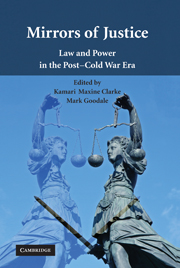Book contents
- Frontmatter
- Contents
- Editor Biographies
- Contributors
- Acknowledgments
- Introduction: Understanding the Multiplicity of Justice
- 1 Beyond Compliance: Toward an Anthropological Understanding of International Justice
- PART I JUSTICE AND THE GEOGRAPHIES OF INTERNATIONAL LAW
- 2 Postcolonial Denial: Why the European Court of Human Rights Finds It So Difficult to Acknowledge Racism
- 3 Proleptic Justice: The Threat of Investigation as a Deterrent to Human Rights Abuses in Côte d'Ivoire
- 4 Global Governmentality: The Case of Transnational Adoption
- 5 Implementing the International Criminal Court Treaty in Africa: The Role of Nongovernmental Organizations and Government Agencies in Constitutional Reform
- 6 Measuring Justice: Internal Conflict over the World Bank's Empirical Approach to Human Rights
- PART II JUSTICE, POWER, AND NARRATIVES OF EVERYDAY LIFE
- PART III JUSTICE, MEMORY, AND THE POLITICS OF HISTORY
- Epilogue: The Words We Use: Justice, Human Rights, and the Sense of Injustice
- Index
- References
2 - Postcolonial Denial: Why the European Court of Human Rights Finds It So Difficult to Acknowledge Racism
Published online by Cambridge University Press: 25 January 2010
- Frontmatter
- Contents
- Editor Biographies
- Contributors
- Acknowledgments
- Introduction: Understanding the Multiplicity of Justice
- 1 Beyond Compliance: Toward an Anthropological Understanding of International Justice
- PART I JUSTICE AND THE GEOGRAPHIES OF INTERNATIONAL LAW
- 2 Postcolonial Denial: Why the European Court of Human Rights Finds It So Difficult to Acknowledge Racism
- 3 Proleptic Justice: The Threat of Investigation as a Deterrent to Human Rights Abuses in Côte d'Ivoire
- 4 Global Governmentality: The Case of Transnational Adoption
- 5 Implementing the International Criminal Court Treaty in Africa: The Role of Nongovernmental Organizations and Government Agencies in Constitutional Reform
- 6 Measuring Justice: Internal Conflict over the World Bank's Empirical Approach to Human Rights
- PART II JUSTICE, POWER, AND NARRATIVES OF EVERYDAY LIFE
- PART III JUSTICE, MEMORY, AND THE POLITICS OF HISTORY
- Epilogue: The Words We Use: Justice, Human Rights, and the Sense of Injustice
- Index
- References
Summary
The European Convention on Human Rights (hereafter, Convention) was signed in 1950 by Western European governments committed to prevent the repetition of the horrors and atrocities of World War II – not to mention the erection of a bulwark against communist Eastern Europe. Admittedly, justice was not originally at the forefront, and has indeed very much remained in the background, of discussions about the Convention system. Nonetheless an implicit narrative has always suggested that the protection of human rights is conducive to the realization of justice. This is clear, for example, in the Convention's Preamble which specifically “reaffirmed” a “profound belief in those fundamental freedoms which are the foundation of justice and peace in the world.” The Preamble referred to “like-minded” governments that shared “a common heritage of political traditions, ideals, freedom and the rule of law.” Not wanting the Convention to be mere words, the members established a system of judicial protection, which was a first in international law. The European Court of Human Rights (hereafter, Court) soon “earned a world-wide reputation for fairness, balance and intellectual rigour” (Harris et al., 1995: vii). This chapter challenges the implicit making of an equation between human rights law and justice by examining a specific area where the record of the Court is anything but strong, that of racial discrimination. In this area, those who have arguably been victims of human rights violations have not met justice at Strasbourg.
- Type
- Chapter
- Information
- Mirrors of JusticeLaw and Power in the Post-Cold War Era, pp. 45 - 66Publisher: Cambridge University PressPrint publication year: 2009
References
- 2
- Cited by



